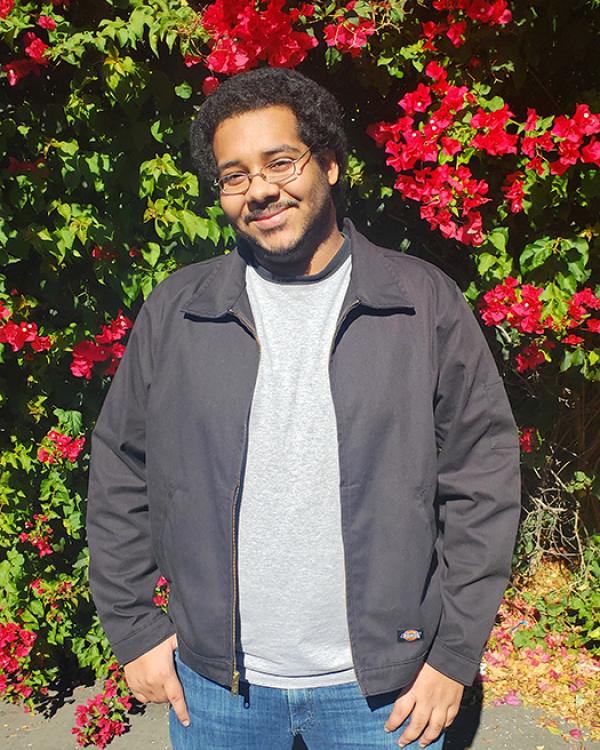
Isaiah Jones is a first-generation "Blackxican" (Black and Mexican) student pursuing his doctoral degree in the Department of Counseling, Clinical, and School Psychology under Dr. Alison Cerezo. As an undergraduate, Jones participated in a number of scholar programs and assistantships surrounding health disparities. His research interests focus on community and peer-based coping strategies surrounding minority and intersectional disparities, help-seeking and health behaviors, emotion regulation, and identity-related experiences.
GGSE: What made you choose to come to UCSB for your graduate work?
Jones: The primary reason I came to UCSB for my psychology doctorate was to work with and learn from my mentor, Dr. Alison Cerezo. Their research not only aligns perfectly with my own research interests, but they are also leading work for diversity through the Healing Space here in Santa Barbara and an Advancing Faculty Diversity grant focused on providing mentorship for Black faculty. I think that this also perfectly represents UCSB’s long history of social justice work and advocacy, which is a fundamental part of intersectional work. Alison is also just amazing to be around and work with in general!
GGSE: As an undergrad at SDSU you worked at The Body Image, Sexuality, and Health (BISH) lab. What was that experience like?
Jones: Working in the BISH Lab was everything I could possibly hope for. It was an unusually large lab with roughly 16 members at any given time, but that, in hand with the extremely friendly and collaborative atmosphere, provided me with ample opportunity to work, learn, and even take the lead in some of their projects. Our P.I., Dr. Aaron J. Blashill, and some of the other project leaders saw the work that I was doing, and I was even offered the position of being the lab’s Recruitment & Media Coordinator for our various projects – which was an incredible opportunity I couldn’t pass up as an undergrad! I was able to learn the ins-and-outs of managing grants and a lab, complete my own projects with my mentor’s support, and enjoy plenty of lab socials! I really do owe everything to the BISH Lab.
GGSE: What are your research interests here at UCSB, and why?
Jones: My research interests lie in the community and peer -based coping strategies surrounding minority and intersectional BIPOC and LGBTQ+ people, stemming especially from identity-related experiences of stigma, discrimination, and internalization of beliefs. As far back as I can remember, I’ve always been interested in the question of, “Who do people turn to, and why?”, and as a Blackxican (Black and Mexican) man, I’ve always been surrounded by discourses of identity and intersectionality. I’m no stranger to what intersectional stress looks like; being familiar with the same type of questions from both sides of that intersectionality: “what are you really? But what do you mostly prefer? You’re not actually ___ though?” On the other side of that, I’m a huge advocate for allyship. While I, myself, don’t identify as LGBTQ+, I believe (and the field tends to support) that there is a lot of overlap between Black, Latinx, and LGBTQ+ peoples especially – not only in their experiences of adversity, but also in their aspects of “Pride.” So, how can we best support them in who they turn to, and what does that look like when they are intersectional?
GGSE: Where do you see yourself five years out after you complete your Ph.D.?
Jones: I’ve been wondering this myself, and hope to have a more specific answer by that time! I do, of course, have some ideas in mind though, based on what goals I wish to accomplish and continue. I want to remain active in research through intervention/prevention program development and dissemination, by specifically working with teams or researchers, organizations, and community leaders, in order to best address health disparities, health/help seeking behaviors, and the barriers that those communities are facing. For that reason, I’m continue to weigh my options between becoming a professor or P.I. (as I really love mentorship and the lab experience as a whole), perhaps becoming a director of a non-profit community org, or maybe having my own private clinic that can also prioritize training and dissemination/science communication.